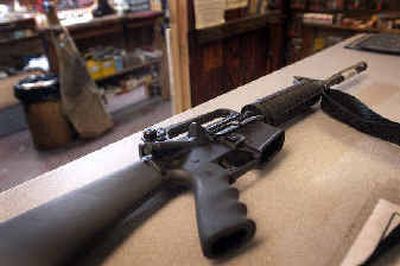Ban on assault weapons dies

WASHINGTON – Sen. John Kerry sought to make President Bush pay a political price Monday for the expiration of a partial assault weapons ban, but other Democrats reacted warily on an issue that has hurt the party in recent elections.
“George Bush made a choice today. He chose his powerful friends in the gun lobby over the police officers and the families he promised to protect,” the Democratic presidential candidate said a few hours after the end of a decade-old ban on 19 types of military-style weapons.
Half a continent away, the issue seemed different to Democratic Rep. Brad Carson of Oklahoma, a key figure in his party’s drive to gain a Senate majority this fall.
“He opposes reauthorization of the assault weapons ban,” said spokesman Kristopher Eisenla. “He is a champion and a supporter of gun owners rights.”
The party’s divisions were on display in the House, as well. There, Rep. Carolyn McCarthy, D-N.Y., and others called for a new ban – at a news conference that none of the party’s top congressional leaders attended.
“It’s an issue that cuts both ways,” said Brendan Daly, a spokesman for House Democratic leader Nancy Pelosi. The California lawmaker supports the ban but has not made its extension a priority.
Under her leadership, minority Democrats have worked to force eight pieces of legislation to the floor in the past two years, including one relating to electricity reliability. But because there is no caucus consensus on the weapons ban, Daly said, it is not among the eight.
“It’s a shame that they’re not as active as we’d like them to be on this, but the NRA’s history on this speaks for itself,” said Rob Recklaus, a spokesman for McCarthy.
“It takes a lot of political courage to take them on,” he said of the well-funded National Rifle Association, which has opposed extending the ban.
Democratic strategists have worried for more than a decade over being perceived as the party of gun control, however popular the issue is in urban and suburban areas.
A decade ago, some Democrats concluded that a vote on gun control legislation played a part in their loss of the House in the 1994 elections.
Five years ago, then-Vice President Al Gore cast the tie-breaking vote in the Senate in favor of a provision requiring background checks for all firearms transactions at gun shows and pawn shops.
Sen. Trent Lott, R-Miss., later predicted it would cost Gore in several border states, and GOP aides said at the time they had maneuvered the vice president into the vote. Some Democrats concurred that Gore’s high-profile support for gun control played a role in his narrow defeat in the race for the White House.
Not all Democrats in Southern or Western states or House districts oppose the ban – just as some moderate Republicans favor a new one.
Nick Clooney, a Democrat running for an open seat in conservative, rural Kentucky, was less definitive.
“I support President Bush’s position,” he said through an aide.
Not many Democrats will admit to that, particularly since Kerry accuses Bush of double-dealing.
Bush has long said he supports an extension. But he did nothing in public to pry one out of the GOP-controlled Congress.
His re-election campaign marked the ban’s expiration by issuing a detailed description of the administration’s anti-crime efforts over the past four years – and noting Bush’s endorsement by the Fraternal Order of Police.
Bush believes the best way to curb gun violence is to enforce laws that are on the books, said spokesman Scott McClellan, adding that violent crime is at a 30-year low.
“The president’s position is well known,” the spokesman told reporters aboard Air Force One as Bush flew to Michigan.